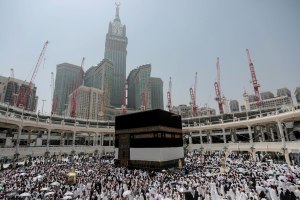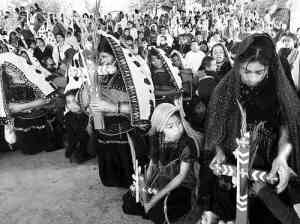This year, as we celebrated Eid Al-Adha, we got the news of the 2015 Mina stampede, where hundreds of people were killed and many others were injured. The tragedy has sparked a variety of reactions, from Iran’s call to the UN to launch an investigation and Turkish critiques of Saudi Arabia’s “management” of the holy sites to many Muslims around the world questioning whether or not Saudi Arabia should be “in charge” of Mecca. In the meantime Saudi Arabia’s mufti has declared that the loses where “inevitable,” and Saudi prince Mohammad bin Salman Al Saud has been accused of playing a central role in the stampede after being escorted into the area by more than 300 personnel.
The news of this catastrophe evoked my very complex relationship with Mecca and Hajj. Since the moment I converted to Islam, I got to see all the paraphernalia surrounding the holy pilgrimage. In some Muslims’ minds, Hajj is the epitome of Islamic practice. Thus, converts are constantly bombarded with the idea that Hajj is what we should strive for as new Muslims.
Once Hajj season hits, we see imams telling people how amazing Hajj is. Some mosques bring in representatives from the specialized Hajj travel agencies to tell us that an investment in Hajj is an investment in the afterlife. Then, in preparation for the pilgrimage Hajj training classes start and hijab stores are filled with prospective pilgrims looking for Hajj-appropriate garments.
And after all this, some of us would stay behind in Canada to celebrate Eid Al-Adha and others, the ones privileged enough to afford several trips in a lifetime or those who had saved their whole lives for the one trip, would go off to Saudi Arabia. Upon their return we would all gather at the mosque to welcome them and treat them as religious royalty. In fact, my mosque would hold several halaqas for women, where those who had performed Hajj would tell their stories and would encourage others to plan to perform Hajj because “you never know when your last day will be.”
The commodification of Hajj truly annoys me. Thus, almost seven years after my conversion, I have never truly envisioned myself performing Hajj. In my mind, what used to be one of the most important sacred rituals (pre-Islamic and after Islam) has been co-opted not only by a Saudi ruling elite that has questionable stands on human rights and pretty racist positions about the pilgrims, but also by the capitalist forces that have overflowed Mecca with five-star hotels and a giant clock, which purpose I cannot comprehend. Not to mention that these capitalist forces are responsible for the destruction of the actual historical and archeological structures of Mecca.
Whereas you have people like Asra Nomani calling to boycott Saudi Arabia and Hajj (mind you, after writing a book inspired by her experience in Hajj), I feel that this is a pretty simplistic way to look at sacred spaces. At the end of the day, Mecca is not the only holy site that has lost a piece of its sacredness.
What about Jerusalem, for instance? After eastern Jerusalem was annexed by Israel in 1967, the city invites bittersweet reactions. A few years ago my aunt and uncle went on pilgrimage to Jerusalem. They were sold the idea that this is the only remaining holy site on earth where Christians, Jewish and Muslims live happily and peacefully together. The problem? My aunt and uncle are Indigenous, Catholic too, but Indigenous first. Hence, what they saw was a painful reminder of the colonial experience and the struggles of Indigenous peoples around the world. It was not about the three religions mingling together… it was about the forceful siege of land by the Zionist government. Soon enough it hit them that a leisure trip to the state of Israel was an oxymoron for an Indigenous couple that sees in the Palestinian struggle an extension of the Indigenous resistance of what we now know as the Americas.
Karbala and other Iraqi holy sites are also vexatious reminders of a lost sense of sacredness. You know? I grew up in a society that is very well acquainted with conflict. Whether it is military coups, guerrilla uprisings, bombings, refugees, etc., Latin Americans have seen a lot in the past century (not to mention 500 years of anti-colonial resistance). But something that often resonates in my mind is being told as a child that sacred space, meaning Churches, where neutral and safe spaces. No one was allowed to hurt you while in Church, no matter what. Of course, this has not always been respected; take for instance Acteal, where a para-military group in Mexico killed more than 40 women and children in prayer. Well, Iraq incites a similar sentiment. Neither Saddam Hussein, nor the Americans or ISIL respected the sacredness of Karbala. The holy site saw the demise of Imam Husayn and since then has seen an incredible amount of human casualties because those who do not respect sacred space do not respect life.
The Vatican is apparently the safest of the monotheistic holy sites. And while it is fashionable these days to love Pope Francis, let’s not forget that the Vatican, the cradle of the papacy, is built on two main things: colonial capitalism and male-white privilege. The papacy has the resources it has today not primarily because Catholic followers pay “their dues,” but because Catholic-Western powers exploited Indigenous and black peoples through colonization and the slave trade for centuries.
And although the Church declared slavery “poisonous” in 1965 and the Pope just apologized for “grave sins” during the colonization of the Americas, they had 500 years to extract resources through slave labour, force Indigenous and black peoples into heteronormativity, Catholicism, patriarchal practices and the alike. Those were very profitable 500 years. In addition, as much as we want to believe that the papacy is becoming progressive through the activities of Pope Francis (who has been controversially associated with the Argentinian dictatorship), let’s not forget that this is the same institution that chastised and excommunicated proponents of Liberation Theology, a theological movement that called priests and nuns to work at the grassroots level to protect the poor and the marginalized. Yes, Oscar Romero, one of Liberation Theology’s main proponents, was recently beatified. Yet, there has not been a real attempt to dismantle the power structures within the Vatican (women, for instance, are still relegated to their role as nuns) or to provide reparations to any of the historically Church-oppressed communities… at the end of the day, it is very comfortable to be the all-progressive Pope in a gold chair.
So where is the sense of sacredness? Is sacredness really attached to these sites? And if so, what does the future hold for us after these spaces have been co-opted by politics and capitalism? If not, why are we crowding the streets of Mecca?
For me, as someone with Indigenous descent and with an attachment to the Third World, there are very few sacred spaces left. Indigenous sites were destroyed long ago or transformed into tourist attractions. Churches and mosques are not necessarily safe spaces, emotionally and otherwise; and the big sites, those “worthy” of pilgrimage, are occupied by powerful elites that have been constantly associated with someone else’s oppression… whether it is the Indigenous, the black, the women and/or the marginalized.
Thus, I keep wondering, where is the sacredness?

